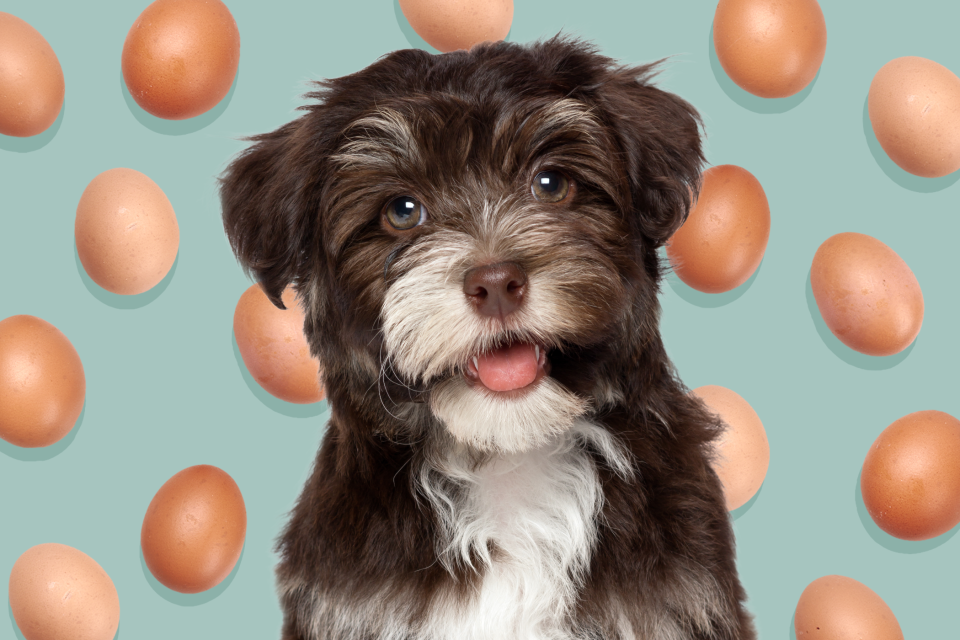Can Dogs Eat Eggs? Sure, Just Stay Away From the Shells
You're probably not alone wondering, "Can dogs eat eggs?" after one rolls onto your kitchen floor. But good news: Dogs can have eggs because they're not toxic and in some cases an excellent source of protein for your pup.
As long as you prepare them correctly, dog parents can feed their dogs scrambled, cooked, and hard-boiled eggs. Keep your dog away from raw eggs and egg shells, however.
Before making any changes to your dog's diet, you'll want to check with your veterinarian. It's important to understand why you're considering feeding her eggs and make sure they're a helpful addition. A supplement or change in food might be a smarter option than eggs for dogs.
RELATED: Can Dogs Eat Raw Chicken? Probably Not
Why Are Eggs Good for Dogs?
Eggs are good for dogs for the same reason they're good for us. "They're a great source of protein," says Ahna Brutlag, DVM, with Pet Poison Helpline, which answers potential poisoning questions for veterinarians and pet owners.
Not only are eggs rich in protein, but they're also a good source of fatty and amino acids, vitamins, and minerals that can be beneficial in keeping your dog's skin and coat healthy.
But before you start scrambling those yokes for Fido, you'll want to make sure you prepare them correctly.

A. Martin UW Photography / Getty / Dorottya Mathe / Shutterstock
Can Dogs Eat Raw Eggs?
It's possible for dogs to safely consume raw eggs, but they shouldn't eat them. Raw eggs for dogs carry a risk of E. coli and salmonella contamination. The U.S. Centers for Disease Control (CDC) says the risk of contamination is much higher with uncooked eggs. It's possible to pick up the bacteria just by handling contaminated eggs, so it's recommended that they be pasteurized or fully cooked before your dog consumes the food.
What makes raw eggs even worse? Dogs who eat raw eggs or other food contaminated by salmonella can shed it in their feces, potentially infecting people and other pets in the household. Infection can lead to symptoms like diarrhea, fever, and stomach cramps—probably not worth the risk when cooking eggs only takes a few minutes.
Can Dogs Eat Eggshells?
No, dogs shouldn't eat eggshells. There's always a chance a sharp edge in the shell will poke your dog in the mouth or get stuck in her throat. If you're crushing up eggshells to supplement your dog's food because you suspect a calcium deficiency, talk to your veterinarian. There are safer options out there.
Calcium deficiency can be serious, Brutlag says, but typically it's only seen in some nursing mothers. If you're concerned your dog is not getting enough calcium in her diet, talk with your vet. They can check for a calcium deficiency and recommend other alternatives—like calcium supplements—that can help you get your dog the nutrients she needs without the risks that come with feeding her sharp eggshells.
RELATED: Can Dogs Eat Mashed Potatoes?Can Dogs Eat Mashed Potatoes?
Can Dogs Eat Scrambled Eggs?
Yup, dogs can eat scrambled eggs. Just make sure they're made plain. Breakfast ingredients we like can be harmful to dogs.
"Does the egg come along with a lot of fat from bacon or cheese?" Brutlag asks. "A big, fatty load of food can lead to weight gain and pancreatitis."
Many ingredients that go along great with eggs in your people-food skillet might be toxic to dogs or add extra calories your dog doesn't need (think butter, oil, onions, or garlic).
Can Dogs Eat Boiled Eggs?
Yes, dogs can eat hard-boiled eggs, cooked egg whites or egg yolks, and sunny-side up eggs. Just make sure to keep the tasty human food ingredients out.
And remember: Moderation is key when feeding your dog any safe human food. Brutlag says a well-cooked egg as an occasional treat should be fine. But dogs who need less protein in their diet because of kidney problems or other medical issues shouldn't have eggs often.
If you're concerned about any nutritional deficiencies in your dog's day-to-day eating habits, check with your veterinarian before making any big changes to your pup's diet. They'll be able to recommend food options that make the best sense for your dog's needs.

